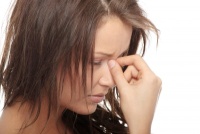Understanding the Causes of Acne
The causes of acne are still a bit of a mystery. We don't know exactly why some people get acne and others don't. But we do know that certain people are born with a genetic tendency to develop acne prone skin.
Acne is inherited as a dominant characteristic -- in other words, it's genetic. If your parents both had acne, there's a 75% chance that you will have it as well -- if only one parent had acne, the chances drop to 50%. Knowing your family's acne history can be helpful when trying to get clear skin.
You might think that acne is caused by dirty skin or poor hygiene. And, you've probably heard that chocolate and greasy foods make you break out. Unfortunately, there are many myths about acne that may prevent people from getting the help they need.
Let's face it -- having acne doesn't make anyone feel pretty or confident, and it can negatively impact your quality of life -- that's why it's so important to seek treatment right away.
Understanding the causes of acne will help you make educated decisions about the best treatment solutions for your skin.
What Causes Acne & Pimples
Acne is caused by a build up of dead skin cells combined with oil and bacteria inside the pores. This build up leads to many different types of blemishes. You might experience blackheads and whiteheads, pustules and nodules, or a combination of inflamed and non-inflamed lesions.
"Problem skin", pimples, zits, hormonal flare-ups, "teen-age bumps" -- whatever you want to call it, these are all acne.
Although the main causes of acne are genetic, many other factors can contribute to break outs, and certain personal habits might be making it difficult for you to get clear.
Hormones
Hormonal changes in the body can lead to an outbreak of acne in children and adults alike. Teenagers entering puberty often experience acne when their bodies start producing testosterone.
Premenstrual and menopausal breakouts are thought to be caused by surges of male hormones which cause increased oil production & lead to clogged pores and inflammation.
Hormonal fluctuations during pregnancy may also produce unpredictable flare ups or clearing of acne.
If you have inherited acne prone skin, you may notice more break outs any time you experience hormonal fluctuations.
Cosmetics & Skin Care
One of the most common causes of acne are cosmetics, hair products, and skin care.
Even if you don't have acne prone skin, you may find that certain cosmetics or skin care products cause you to break out. Many ingredients irritate skin follicles and can cause pore clogging, which leads to cosmetic acne.
What's even more frustrating is that many popular acne treatment products contain pore clogging ingredients!!
Sometimes the very thing you're putting on your skin to get rid of acne is actually the thing causing more breakouts -- SO unfair.
Reading ingredient labels yourself or getting recommendations from an acne expert are the best ways to be sure you're using products that won't clog your pores.
Learn more about which pore clogging ingredients you should avoid.
Skin Picking - Pimple Popping

Deliberate manipulation of the skin in the form of picking, popping, squeezing, or scratching is very harmful and can lead to prolonged healing. Skin picking is also one of the top causes of acne scarring.
The 3 categories of skin picking:
- The practical picker - You go to the mirror intending to pop pimples because you've discovered that you can squeeze the contents out of some lesions, and they'll heal faster. You also know that most lesions only get worse when you pick, but you find it hard to stop. This can become an obsession because it makes you feel like you're "doing something" about your acne.
- The nervous habit picker - You may not even be aware that you're picking. You might do it while watching TV or reading, or you might run for the mirror whenever you're feeling stressed out or nervous.
- The compulsive picker - You literally give yourself acne by picking at tiny imperfections. This is a very serious condition, known as acne excoriee. If you're under a tremendous amount of stress and think you might be a compulsive picker, you may find that hypnotherapy or psychologic counseling can help. Please know that you're not alone, and help is available.
Your skin will never heal properly as long as you continue to squeeze, pick, or scratch your acne lesions. Most often, you'll prolong healing that has already taken place under the surface of your skin, and you may even cause secondary infections by introducing germs and bacteria from your hands and fingernails.
The best way to get rid of acne lesions is to find an acne expert that has training in extractions and knows how to remove blackheads and pimples properly.
Your acne specialist can help you understand which causes of acne are affecting your skin. Professional extractions combined with an effective acne skin care system are the fastest, safest, and most effective way to get your acne under control without causing prolonged healing and scarring.
Diet & Nutrition
There's an old saying, "An apple a day keeps the doctor away". It implies that by eating certain foods, we will enjoy good health.
Although there is no conclusive medical evidence that diet and nutrition effect acne prone skin, it is my experience that eating a balanced diet will help keep your skin looking and feeling healthy and there are some foods that cause acne flare ups for certain people.
I believe nutrition plays an important role in overall skin health. Proper diet along with vitamins and herbal supplements can help reduce inflammation and assist your body's self cleansing & healing mechanisms.
Most experts agree that chocolate and greasy foods don't necessarily cause break outs.
However, excessive or long-term ingestion of iodides (also known as iodine) does cause acne. Once iodine enters the bloodstream, the excess is excreted through the oil glands. This process irritates the pores and is one of the most common causes of acne break outs and inflamed pimples.
Large amounts of iodides can actually cause acne in people who don't usually suffer with acne prone skin. High levels of iodides are contained in shellfish, seaweed, and other common foods, as well as many health foods and sports drinks.
Medications | Drugs
Certain prescription and recreational drugs, as well as over the counter medications can cause or aggravate acne. To reduce your chances of acne break outs, you'll want to consider all of the potential side effects of these drugs before use and choose other options when practical.
The following drugs can aggravate acne:
- Bromides: Common in cold and flu medications
- Cocaine and Speed
- Marijuana: Lowers and then raises testosterone levels, producing an imbalance in hormones. In addition, sometimes crops are sprayed with toxic herbicides that can cause acne flare ups.
The following drugs can cause acne:
- Corticosteroids: Topical or oral corticosteroids (such as Prednisone and Methylprednisone) are often used to treat asthma and other chronic lung diseases. These drugs can stimulate oil production and lead to acne break outs.
- Dexamethasone, Prednisolone, Betamethasone, Cortisone, Hydrocortisone, Triamcinolone, Anabolic Steroids, Danocrine (Danazol), Stanozolol (Stomba)
- Anticonvulsants (Dilantin): Prescribed for the treatment of Epilepsy and other kinds of seizures. Most medications in this family list acne as a common side effect.
- Lithium Carbonate: Commonly used to treat Bipolar Disorder.
- Thyroid Medications: Certain thyroid medications, used to stimulate the thyroid gland in patients with low thyroid function (such as Thiourea and Thioracil), are known to trigger acne.
- Quinine: Prevents and treats MalariaINH (Isoniazid): Treats Tuberculosis (TB).
- Immuran: Prescribed to suppress the immune system in patients awaiting an organ transplant.
- Danazol (Danocrine): Used for hormone management
- Hormones: Progesterone, Androstendione, Testosterone. If you have acne prone skin, it's best to avoid the following contraceptives because they're high in androgen activity and low in estrogen (Loestrin, Estrotrep Fe, Levlen, Alesse, Ovral, Norestrin, Nuvo Ring, Depo Provera, Provera)
- Gonadotrophin: Sometimes prescribed for pituitary disorders, this medication can indirectly cause acne by stimulating testosterone production.
- Cyclosporin: Used to prevent organ rejection in post-transplant patients.
- Bromine & Iodine: While these medications are much less common today than in the past, they are still used in cold & flu remedies. During recent catastrophies, many people took iodine tablets to prevent or counteract the effects of nuclear radiation. Iodides are also contained in many health foods and sports drinks.
- Disulfuram (Antabuse): Prescribed to help chronic alcoholic patients stay sober.
- Phentermine: A diet drug that can cause inflamed acne.
Industrial Chemicals That Cause Acne
Many chemicals can aggravate acne when they come into contact with your skin.
Check the list below to see if these work-place chemicals are one of the causes of acne you're exposed to on a regular basis:
- Coal Tars: Often used in roofing materials, pavement sealing products, and industrial boilers.
- Grease: If you work in an environment where your skin is constantly exposed to large amounts of occlusive, airborne grease (such as an auto mechanic's shop or restaurant kitchen where food is fried), you may notice that it's more difficult to control your acne.
- Chlorinated Industrial Chemicals: Used in herbicides and toxins -- may cause Chloracne.
- Dioxin: Often found in herbicides -- may cause other harmful side effects including cancer.
- Fabric Softener: Machine grade oils and waxes are used in fabric softener dryer sheets and liquids. These agents -- which make your pillow cases, towels, and clothing soft and static-free -- are highly comedogenic and will aggravate acne break outs.
Stress and Acne

One of the main causes of acne is stress. Most experts say that stress is the number one acne aggravator, because when you're under stress, the adrenal gland produces more of the male hormone testosterone -- this leads to more oil production and the condition known as Retention Hyperkeratosis.
Think about how often you've felt stressed out by a final exam at school, dating problems, financial problems, or difficulty at work. During these times of stress, your skin seems to break out immediately.
Remember that acne is a chronic disease, and even when your skin looks clear there are still tiny impactions causing constant tension inside your pores. When acute stress weakens the body and lowers your resistance, you may suffer from an immediate break out.
Stress reduction and relaxation techniques can be very helpful when trying to control acne. You may want to try meditation, guided visualization, or professional massage to help you manage stress. Yoga and other forms of physical activity have been proven to be helpful as well.
There are many different techniques available for stress management. Try a variety to find out what suits you best.
Keep in mind - the causes of acne are different for each person. That's one reason why it can be helpful to get a customized treatment plan from an acne expert.
Fortunately, there are many effective treatments available that can get your skin clear.
Back to Acne Prone Skin Care Solutions Home